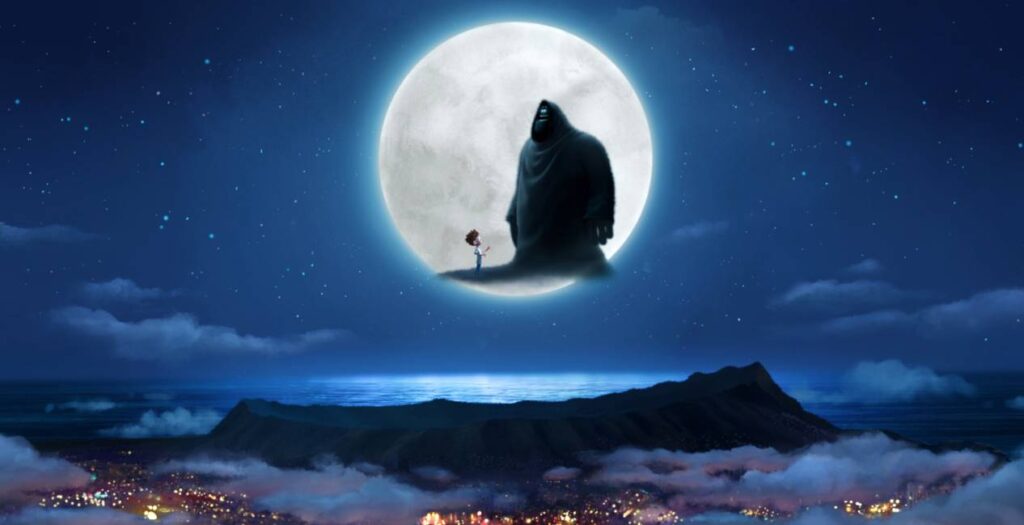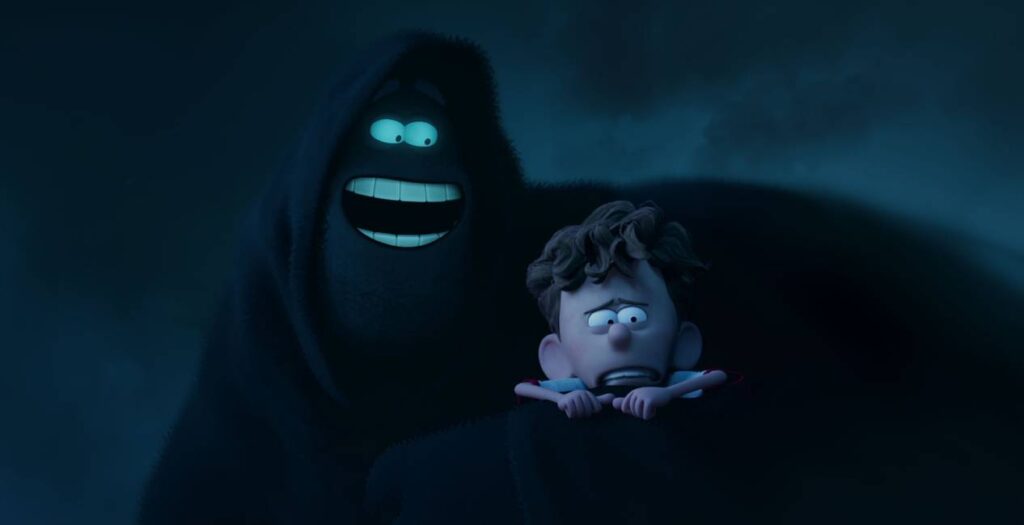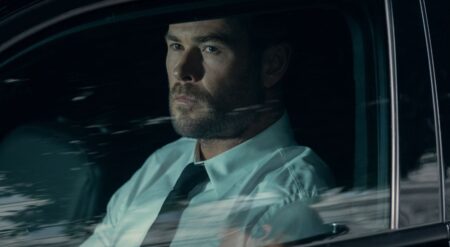Charlie Kaufman’s latest screenwriting effort, Orion and the Dark marks a significant detour from his filmography. It targets children directly with its clean, cutesy animation. Clearly intended for younger viewers, the film still sits firmly with the rest of Kaufman’s celebrated oeuvre, packing an existential punch that resonates with both young and old.
Adapted from Emma Yarlett’s book of the same name, Orion and the Dark centers on Orion (Jacob Tremblay), a seemingly average elementary school kid who doubles as a concentrated ball of anxiety. He’s completely immersed in a steady stream of irrational fears that he colorfully jots down in his notebook, whether they be bees, cell phone waves, or killer clowns.
But what frightens him the most is something he confronts every night: the dark. It’s not long before the literal personification of his worst fear, Dark (Paul Walter Hauser), pays him a visit on a stormy night and whisks him away on an overnight journey to prove there is nothing to fear of the night. An adventure full of bonding and understanding ensues as Orion is forced to embrace the unknown and overcome his fear to live life to the fullest.
The prolific Charlie Kaufman is synonymous with dreamy meta-narratives that loop in on themselves in glorious, confounding ways. He is arguably cinema’s most accomplished absurdist, dizzyingly bending genre and style to craft works that are layered with meaning, metaphor, and multitude. It’s not so much that the rules of filmmaking—and reality, for that matter—don’t apply to him but that they simply cease to exist in his stories. He boldly uses the extraordinary to masterfully deconstruct the ordinary. Though the maestro behind Adaptation, Being John Malkovich, Eternal Sunshine of the Spotless Mind, and Anomalisa defies categorization, it’s not hard to see why his stories wouldn’t resonate with the youngest of audiences—often benefiting from the older, jaded perspectives moviegoers bring with them.

While on the surface, this plot sits right at home with many a children’s animated movie. The profundity likes in how inventively director Sean Charmatz and Kaufman distill such universal ideas to their essence, examining our relation to our fears, our self-image, and our families in ways that are both complex and deceptively simple. Orion and the Dark quickly fold onto itself, constantly redefining its narrative in both perspective and scope as it shifts periods and narrative devices almost seamlessly.
In this way, it taps into the power of storytelling itself, commenting on how stories should be complicated, multi-faceted, and ultimately human. The truly impressive feat is how Orion and the Dark holds itself to that standard, approaching its seemingly simple tale of self-discovery in new, ambitiously offbeat ways at each turn, either visually, thematically, or, in classic “Kaufman-esque” fashion, meta-narratively.
This is especially true in its whimsical final act, where the film deliberately writes itself into a corner and twists out of it by breaking the fourth wall while also rewriting the tenets of its narrative. Orion and the Dark morphs from a familiar coming-of-age tale into a heartfelt meditation on how stories evolve. How they help us grow, and how necessary they are to connect us to our families from generation to generation.
While the film threatens to become too heady for younger audiences (at one point referencing David Foster Wallace’s “Infinite Jest”), it never fails to retain a charm that is easy for any child to grasp. Particularly because Orion and the Dark is so markedly funny, full of visual gags, vibrant characters, and cinematic references (including a short film narrated by Werner Herzog) that underpin the wanton existentialism. Hauser is as utterly loveable and dynamic as Dark, a shapeshifting, primordial being who has the thankless job of bringing nighttime to the world. He brings great range to a character who hates that he’s more associated with fear than joy, often heartbreakingly questioning why he was created in the first place.

But it’s his ragtag group of buddies (dubbed the “Nighttime entities”): Insomnia (Nate Faxon), Quiet (Aparna Nancherla), Sleep (Natasia Demetriou), Sweet Dreams (Angela Bassett), and Unexplained Noises (Golda Rosheuvel). The troupe is as delightful to be with as they are oddly amusing, each an important, hilarious cog in the machine of night as they embody both the terror and beauty of the unknown.
More importantly, they allow Orion and audiences to embrace fear as a pivotal piece in the puzzle of human existence. The ensemble bounces off each other cathartically, manifesting more as developed characters rather than “mascotable” caricatures— avoiding the missteps of other animated contemporaries.
As an animated experience, Orion and the Dark is a stellar amalgamation of styles. Its plasticine-like 3D art style is full of wonderfully expressive faces and painterly landscapes, beautifully giving way to offbeat hand-drawn sequences. The rhythmic editing only serves to heighten the effect, effortlessly slipping between the subconscious, reality, and everything in between on a whim.
Orion and the Dark is a full-bodied experience that pays attention to the little details as much as the big ideas. However, it makes it that much more unfortunate that it isn’t gracing the silver screen. Nonetheless, it’s a thoughtful film that pushes both kids and adults alike to look inward at the fears that still hold sway over us and the stories we tell ourselves and loved ones to overcome them.
Orion and the Dark premieres Feb 2nd, exclusively on Netflix.
Orion and the Dark
-
Rating - 8.5/108.5/10
Orion and the Dark
…It’s a thoughtful film that pushes both kids and adults alike to look inward at the fears that still hold sway over us and the stories we tell ourselves and loved ones to overcome them.







